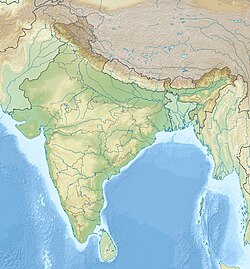| Aie River | |
|---|---|
 The Dwijing Festival on the banks of Aie River | |
| Native name | আই নদী (Assamese) |
| Location | |
| State | Assam |
| Physical characteristics | |
| Source | Black Mountains (Bhutan) |
| • location | Bhutan |
| • coordinates | 26°48′11.3″N90°40′34.2″E / 26.803139°N 90.676167°E |
| Mouth | Manas River |
• location | Bangpari, Chirang District, Assam |
| Basin features | |
| Progression | Aie River - Manas River |
The Aie River is a tributary of the Manas River in the Indian state of Assam. The river originates from Black Mountains (Bhutan), flows through the Chirang district of Assam and joins Manas River at Bangpari of Chirang district. [1] Aie means mother in Bodo language. The Dwijing Festival, which is a colorful celebration of Assam's culture, [2] is an annual festival set on the banks of Aie river near the Hagrama bridge of Chirang district.

